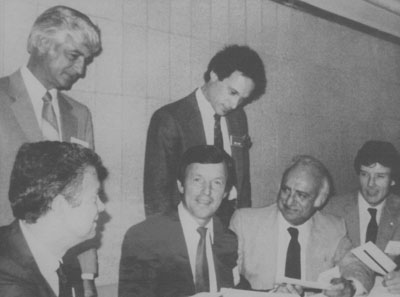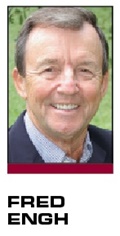I
don’t know where they are today but I do know one thing: Without the belief in me of three sports manufacturing executives, I might have ended up on the poor side of town with a wife and seven kids.
Their names are Fred Brooks, former CEO of MacGregor Sporting Goods; Bob Seagren, Olympic champion and former executive vice president of marketing and sales at Puma; and Bob Spanjian, former CEO of Spanjian Sportswear.
So let me tell you what happened.
It was 1976, and I was working for a division of the Sporting Goods Manufacturers Association called the Athletic Institute as the national director of youth sports.
As a former high school coach, athletic director and eventually a recreation professional, I had a wealth of experience dealing with sports for kids. One of the things that bothered me so much was to see the abuse so many children faced as the result of untrained volunteer coaches and parents who placed undue pressure on their kids just so they could make it to the major leagues. I could tell you so many horror stories I witnessed that it would take 50 columns like this to scratch the surface.
One day, I walked into the president’s office at SGMA and I told him that I had an idea. I said I would like to hold a conference on youth sports and invite all the youth sports organizations in the U.S. to attend. He said, “You gotta be kidding me. These people are all fighting to get the same kids in their sports program. Why would they ever want to meet?”
 |
Engh (second from left) with executives (from left) Fred Brooks, Bob Spanjian and Bob Seagren
Photo by: COURTESY OF FRED ENGH
|
I begged him to give me a chance.
He relented.
Two months later, there were 26 out of 27 organizations from Little League Baseball to Special Olympics that attended the conference, and the talk focused on one thing throughout the three-day meeting: what to do about the coaches and parents who put a black eye on what we’re trying to do.
Armed with the confidence that the coach and parent problem was a consensus among youth sports directors, I left the meeting with one thought in my mind: Why isn’t anybody doing anything about this problem?
Now, fast-forward to three years later. I tried to convince the new SGMA director to allow me to start an organization that would include the training of coaches on how to make sports fun and safe for kids. His words, not mine: “That’s the dumbest idea I’ve heard in a long time.”
His rationale for denying me was that he felt that no volunteer coaches in youth leagues would stop what they are doing and go to a training program.
Frustrated, I decided to leave AI and form my own nonprofit with the idea of creating a program to train volunteers working with children in sports. I wasn’t sure how I was going to support myself, a wife and seven kids, but sometimes you become blinded — or, as some people called me, crazy.
Now to the good part.
After working in the sporting goods industry for seven years, I got to know many of the top executives at different companies. The SGMA would hold annual meetings with manufacturers, and I was lucky enough to attend.
In 1980, an SGMA meeting was held in New York, and at this time I was desperate. I had borrowed all the money I possibly could, and the only place left to turn were the three manufacturers who I felt might help: Brooks, Seagren and Spanjian.
I wrote to all three asking if I could meet with them in New York at the SGMA show. Knowing how busy top executives are at a show, I knew it would be a long shot. Much to my surprise, they all said yes.
I scraped enough money together to buy a plane ticket and stayed at a friend’s house in Manhattan. I was very nervous in attending because the SGMA director wasn’t too pleased with me leaving AI, and I knew if he spied me he would probably have me removed from the building.
I don’t know how it happened, but all four of us were sitting behind the curtain of Spanjian’s booth. After a bit of pleading with them to help support my idea, I made the scariest statement of my life: “This is either the first day of the start of this organization or the last,” I said.
My heart dropped when Brooks said, “We’re in.” And after that, the rest followed, and I walked out of the room with a commitment of $36,000.
I tell this story not to regale you with my accomplishment but to tell you that in the sports industry there are many great people who care and believe in other people. I was one of the lucky ones.
I believe people in the sporting goods industry became who they are through the power of sports. They understand the agony of defeat and they understand struggle. They understand the will to never give up.
And that is why I owe eternally Fred Brooks, Bob Seagren and Bob Spanjian, who learned also through sports the meaning of compassion.
Oh, so what happened?
Our organization, the National Alliance for Youth Sports, has trained more than 3 million volunteer coaches, parents, professional youth sports administrators, and officials from parks and recreation departments, Boys and Girls Clubs, and U.S. military bases worldwide. And through our worldwide expansion, we are bringing sports to developing countries throughout Latin America and soon to be an exciting program in Haiti.
Fred Engh (fengh@nays.org) is the founder, CEO and president of the National Alliance for Youth Sports and International Alliance for Youth Sports. He is the author of “Unsinkable Spirit,” which was published earlier this year and received an honorable mention designation at the 10th annual Hollywood Book Festival.





